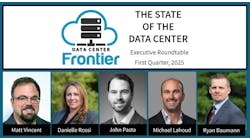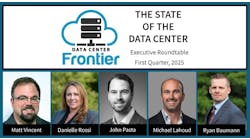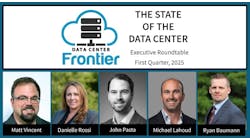The Data Center Frontier Executive Roundtable features insights from industry executives with lengthy experience in the data center industry. Here’s a look at the insights from Phillip Marangella, Chief Marketing and Product Officer for EdgeConneX.
Phillip Marangella is the Chief Marketing and Product Officer at EdgeConneX, where he develops and executes the company's marketing and product strategies. With 25 years of experience in international marketing, strategy, and business development across the data center, telecom, and technology sectors, he brings significant expertise to his role.
Before joining EdgeConneX, Phillip held key roles at companies including Equinix, CoreSite, Verizon Business, MCI, Nortel, Globalstar, and Satphone. He also co-founded a tech consulting firm focused on international technology transfer and venture funding of university-developed technology.
Phillip serves on the marketing advisory boards for Lokker, Salute Mission Critical, and Infrastructure Masons. His leadership has earned him several awards, including the Infrastructure Masons Champion Awards for Diversity & Inclusion and Education in 2021; and the PTC'23 Outstanding Diversity and Inclusion Champion Award for developing and mentoring HBCU Capstone Programs. Recognized as a top 10 marketing executive by DataCentre Magazine, Phillip won the Datacloud Global Agent of Change Award in 2023.
Phillip holds a Bachelor's degree in Political Science from the University of California, San Diego, and a Master's in Multinational Commerce from Boston University. His extensive background and innovative approach drive growth at EdgeConneX.
Here's the full text of Phillip Marangella's insights from our Executive Roundtable:
Data Center Frontier: To open the Second Quarter of 2024, Data Center Frontier's Founder and Editor at Large Rich Miller doubled down on a definitive call originally made in his annual industry trends forecast: The age of the gigawatt data center MegaCampus is truly upon us. From your perspective, what are the most pertinent front-of-mind considerations, whether geographic, regulatory or otherwise, for MegaCampus stakeholders including investors, developers, operators, partners, vendors, and customers?
Phillip Marangella, EdgeConneX: Not long ago, the entire Ashburn market represented a gigawatt. Now, we are seeing demand for gigawatt campuses in multiple markets worldwide, which shows how much demand is occurring globally for data center infrastructure.
The rapid emergence of AI’s capacity demands, added to an already robust data center market powered by the cloud, has turbocharged the need for super-scale data center campuses.
Of course, this will place many challenges on providers, from developing new data center designs that can also support the rapidly growing density requirements for AI, to raising the tens of billions needed to fund these builds -- and then coordinating the supply chain and delivery schedules to be able to deliver all of that capacity on time and on budget.
Buckle up. The Gigascale era is upon us.
Data Center Frontier: In the industry's now ongoing level-up to global net zero and decarbonization goals, what processes should data center developers and operators be prioritizing for a proactive approach to building greener data centers and fostering resilient sustainability practices, especially in the face of the exponential future power demands associated with AI and GPU-based computing?
Phillip Marangella, EdgeConneX: Implementing 24/7 carbon-free energy, leveraging wind, solar, hydro, geothermal, nuclear, and other carbon-free sources, ensures real-time confirmation of clean power supplies, with AI-based solutions enhancing real-time matching.
And integrating battery storage solutions ensures high availability and contributes to the decarbonization of local grids.
Other key areas include innovative water and waste management practices to minimize environmental impacts on surrounding communities.
In addition, by structuring innovative financing mechanisms around sustainability targets, data centers can lower capital costs and set industry precedents.
Transparency through regular reporting is not just a practice; it's a commitment to foster collaboration. Collaboration is the key to driving industry-wide innovation and efficiency.
Collaboration should be central to one's sustainability approach. We can all develop effective strategies that create a sustainable ecosystem by working closely with our customers, suppliers, and communities. This approach fosters growth for our business and the planet, making everyone a part of this vital journey.
Data Center Frontier: From your view of the data center industry, what are the top opportunities for any type of modular design innovation within or adjacent to hyperscale or colocation facilities, the better to measure up to escalating compute as well as grid and on-site power requirements for meeting the expected, ongoing rise in demand for ultra-cloud, HPC and AI/ML workloads?
Phillip Marangella, EdgeConneX: In addition to the massive scale that we now have factored into our builds, we also must accelerate the speed at which we build AI data centers. Modular and pre-fab design and build solutions will significantly help to shorten the time to market for new capacity.
Similarly, alternative, on-site power generation is something EdgeConneX has been doing to augment the grid in power-constrained markets like Dublin.
Given the massive demand for new data center capacity, more markets will have constrained power in the future. So, short-term and long-term power alternatives will be essential to ensure we can provide customers with adequate and scalable power solutions.
Data Center Frontier: What are some data points or anecdotes people persistently seem to get wrong or misbelieve about your area of the data center sector?
Phillip Marangella, EdgeConneX: As we enter the AI era, data center operators must better explain the industry's role in supporting global infrastructure and technological advancement.
In reality, hardly any person or business is unaffected by the advantages of cloud computing and AI.
A common misconception is that data center energy usage has significantly increased. Despite a dramatic 500% rise in computing power, storage, and network traffic, the percentage of electricity used by data centers has remained relatively stable over the past decade.
This stability is a testament to the industry's phenomenal innovation in efficiency, where new deployments operate using less electricity while generating lower carbon emissions. Scientists have documented significant improvements in cooling and power provisioning that counterbalance the growing number of servers.
But rather than talking about the gains in efficiencies that data centers have made, we need to tell more relatable stories about the impacts that data centers have on every industry and every person in the world. Doing so will help regulators and communities better understand how all the technologies enabled by data centers positively impact their companies or lives.
From farmers to hospitals, airlines to manufacturers, governments to utilities, and in our daily lives, everyone benefits from the data center infrastructure powering the world's digital economies. Because of AI and the cloud, many people and industries are becoming far more efficient and sustainable in their lives or businesses.

Matt Vincent
A B2B technology journalist and editor with more than two decades of experience, Matt Vincent is Editor in Chief of Data Center Frontier.





